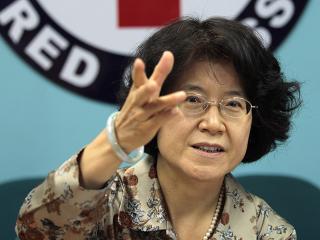From the Manila Bulletin (Dec 4): US rebalance to Asia beneficial
The Philippines needs support from the United States in order to safeguard its sovereignty and territorial integrity, according to Foreign Affairs Secretary Albert del Rosario.
In a speech after receiving his award from the Ateneo School of Government as Professorial Chair for Public Service and Governance, Del Rosario also said the country stands to benefit from the US rebalance to Asia, a move that is not only limited to defense and security cooperation but also encompasses economic arrangements and greater people-to-people exchanges.
He said Philippine-US relations have reached new heights and that this broadening and deepening relations is being positively viewed in the context of the US rebalance toward Asia.
Del Rosario hopes to see the increased rotational presence (IRP) framework agreement between the two countries completed at the earliest possible time.
He said the IRP is the policy which increases the presence of US forces in Philippine territory and is meant to support the development of a minimum credible defense posture through capability-building and combined activities.
He said it also entails high-impact, high-value joint exercises focusing on maritime domain awareness, maritime security, humanitarian assistance and disaster response.
“The IRP is premised on mutuality of benefits and is in full accord with the Philippine Constitution,” he said.
He said several issues remain to be agreed upon after four rounds of negotiations on the IRP framework.
Del Rosario said the Philippines already benefitted from the overwhelming and timely provision of resources by the US in search, rescue and relief operations in areas devastated by super typhoon Yolanda.
He noted that over 50 aircraft and ships, including over 1,000 marines and US soldiers, provided direct assistance on the ground to save countless lives.
“The immediate and comprehensive support of the US on humanitarian assistance and disaster response highlights the areas of cooperation included in the IRP framework,” he said.
http://www.mb.com.ph/us-rebalance-to-asia-beneficial/
Around 160 public consultations targeting 7280 persons would be spearheaded by 8 organizations which have partnered for the project formally named Building Peace in Mindanao through Public Participation in Governance.
BTC Chairman Mohagher Iqbal, who signed the agreement in behalf of the Commission, expressed hopes that the planned dialogues and advocacy activities would lead to a deeper understanding of the Bangsamoro Basic Law, the drafting of which is the primary function of the BTC. And as coordinating and conducting public consultations is also another major function of the commission, he stressed that the agreed public engagements would be in furtherance of the said function of the commission.
Before the formal signing rites, several commissioners made queries into the details of the proposed consultations --- its goals, coverage, methodology and feedback mechanism. Each of the 8 project partners presented its designated tasks in the overall design of the project.
The project partners include MindaNews, Bangsamoro Leadership & Management Institute (BLMI), United Youth for Peace and Development (UNYPAD), Peace Advocates Zamboanga (PAZ), Mindanao Business Council, Mindanao Association of State Colleges & Universities (MASCUF), Teduray Lambangian Women’s Organization (TLWOI), Nisaa ul Haqq Fii Bangsamoro and The Asia Foundation (TAF) as associate partner.
Chairman Iqbal noted that the conduct of public engagements presents a challenge to the Commission considering the timeline and resources. He therefore expressed appreciation to the Conciliation Resources for extending assistance in reaching out the grassroots of Bangsamoro and even non-Bangsamoro communities.
The other commissioners who witnessed the signing were Froilyn Mendoza, Akmad Sakkam, Asani Tammang, Pedrito Eisma, Abdulla Camlian, Said Sheik, Raissa Jajurie, Ebrahim Ali and Melanio Ulama.
Kristian Herbolzheimer, Director of Philippine Program, signed the instrument in behalf of Conciliation Resources. Based in the United Kingdom, it is an independent organization that provides practical support to help people living in the midst of conflict, prevent violence and build peace.
Last October 17, a similar agreement was entered into by and between the BTC and the Mindanao Civil Society Organization Platform for Peace (MCSOPP), a grouping of at least 120 organizations and networks which also aim to generate massive public support for the Bangsamoro Basic Law.
http://www.luwaran.com/index.php/welcome/item/694-public-consultations-on-bangsamoro-basic-law-to-be-increased














